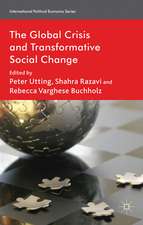On Globalization: Capitalism in the Twenty-First Century
Autor B. Amorosoen Limba Engleză Paperback – 10 iun 1998
| Toate formatele și edițiile | Preț | Express |
|---|---|---|
| Paperback (1) | 638.11 lei 6-8 săpt. | |
| Palgrave Macmillan UK – 10 iun 1998 | 638.11 lei 6-8 săpt. | |
| Hardback (1) | 641.20 lei 6-8 săpt. | |
| Palgrave Macmillan UK – 10 iun 1998 | 641.20 lei 6-8 săpt. |
Preț: 638.11 lei
Preț vechi: 750.72 lei
-15% Nou
Puncte Express: 957
Preț estimativ în valută:
122.11€ • 126.16$ • 101.58£
122.11€ • 126.16$ • 101.58£
Carte tipărită la comandă
Livrare economică 20 martie-03 aprilie
Preluare comenzi: 021 569.72.76
Specificații
ISBN-13: 9780333930731
ISBN-10: 0333930738
Pagini: 232
Ilustrații: VIII, 218 p.
Dimensiuni: 140 x 216 x 13 mm
Greutate: 0.35 kg
Ediția:1998
Editura: Palgrave Macmillan UK
Colecția Palgrave Macmillan
Locul publicării:London, United Kingdom
ISBN-10: 0333930738
Pagini: 232
Ilustrații: VIII, 218 p.
Dimensiuni: 140 x 216 x 13 mm
Greutate: 0.35 kg
Ediția:1998
Editura: Palgrave Macmillan UK
Colecția Palgrave Macmillan
Locul publicării:London, United Kingdom
Cuprins
List of Figures and Tables Acknowledgements Introduction The Dynamics of Socio-Economic Formations Internationalization and Capitalism: From Dualism to Marginalization The World Economy and Capitalism: Capitalist Globalization of the Economy and Technology Capital Accumulation in the Last Decade of the Twentieth Century: the End of Development The Metamorphosis of the Firms: National, Multinational, Transnational Globalization and European Integration: Eurocentrism and Westernization Social Class and Political Power: Authors, Actors and Institution Alternative Policies to Globalization: A Polycentric View Toward Mediterranean Co-development Bibliography Index
Recenzii
'Wide ranging, well written and provocative, Bruno Amoroso's economic, social and cultural insights into the process of globalisation should be valued for their explanatory power and clarity by teachers and students alike. At once a global tour d'horizon and an intellectual tour de force.' - Stuart Holland
Amoroso is prepared to follow Marx in claiming that 'globalization' is the historical form of the paradox of capitalism's growth, but he is not prepared to argue either that this paradox produces a revolutionary class capable of resolving it, or that the paradox will explode itself in some final crisis. Instead, he believes that we must meet the world halfway, recognizing the multi-national nature of our interests, but seeking to organize those interests in 'polycentric' communities, capable of fostering 'partnership, cooperation and exchange'. - Times Literary Supplement
Amoroso is prepared to follow Marx in claiming that 'globalization' is the historical form of the paradox of capitalism's growth, but he is not prepared to argue either that this paradox produces a revolutionary class capable of resolving it, or that the paradox will explode itself in some final crisis. Instead, he believes that we must meet the world halfway, recognizing the multi-national nature of our interests, but seeking to organize those interests in 'polycentric' communities, capable of fostering 'partnership, cooperation and exchange'. - Times Literary Supplement
Notă biografică
BRUNO AMOROSO is Professor in European Integration and Social Cohesion in the Wider Europe (Jean Monnet Chair) at the Department of Social Sciences, Roskilde University, Denmark. He is also President of the Federico Caffe Centre, Coordinator for the European, Mediterranean and South East Asian Networks for Innovation and Co-development, and Director of the Mediterranean Project sponsored by the Italian Economic and Labour Council. Among his books are Macroeconomic Theories and Policy for the 1990s (editor with J. Jespersen), Scandinavian Perspectives on European Integration, and Welfare Society in Transition (editor with J. Jespersen).













